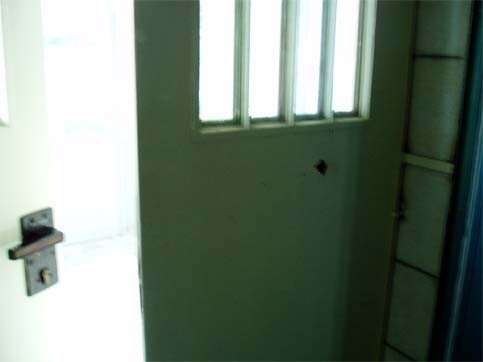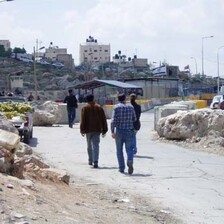From that checkpoint at the edge of the West Bank where the Israeli airport taxi dropped us off, the way to Ramallah winded through dark valleys on the western slopes of the West Bank, through many new Israeli colonies (the so-called “settlements”). We took a Palestinian taxi to Ramallah, the same one that was sent to pick us up from the airport but was prohibited from doing that and told to follow us.
The driver was worried about going back along that way, in between the colonies. Though the colonies were lit with bright lights, they wore a gloomy face and appeared very quiet and sleepy as everyone hid inside their houses. Each colony was surrounded by barbed wire enclosing a large swath of land (forcibly taken from neighboring Arab villages). The entrance to each colony was further guarded by armored personnel carriers or tanks. It was clear that those Israeli colonists, while appearing tough in public, lived in great fear.
A while afterwards, we finally reached an older (and not as well-paved) road connecting Arab villages. At the intersection stood an empty Israeli guard tower which, in the gloom of night, looked more like a haunted Transylvanian castle. “This is the checkpoint where a Palestinian sniper killed ten [Israeli] soldiers. They closed it down now.” On our first night in Palestine, it felt so eerie.
Fortunately, the older road entered the Palestinian village of Bir Zeit, home of the famous Birzeit University and home to several-thousand-year-old olive presses. Finally I encountered familiar ground. Unlike the road connecting Israeli colonies which skirts the edges of habitation, this road went right through the ancient village, and though the street lights were not as bright, the village people were out on the streets, their shops open, children playing, and loud music blazing from outdoor restaurants. The whole town was alive, and fear was not in their air that night. Though the driver was afraid someone would attack us because his car had an Israeli license plate, nothing of that sort happened.
After those long 24 continuous hours of travel and lack of sleep, our first night back home was very depressing. The first thing that greeted us walking into my parents’ house was a large bullet-hole in the door, left as a souvenir by Israeli soldiers who were searching houses during the incursion of April 2002. Though the caretaker back then offered them the keys, explaining that the owner of the house was on travel, the soldiers insisted on shooting at the door. The shot was far from the lock. Instead, it penetrated two layers of door, one of them supposedly “bullet-proof”, then exploded into many fragments, traces of which could be seen on the opposite wall of the living room. The central fragment went through the wall, through the back then the front of a wooden closet on the other side, and all the way out the window on the other side of the house, breaking the glass.

Bullet hole through the door of a house in Ramallah (March 2004)
The firing of this “dum-dum” bullet was clearly not about opening the door. It was not a warning shot. It was rather about showing us who’s boss - who can shoot through many doors, walls, and rooms. Luckily my parents were away at that time, or else they might have thought to answer the door.
Despite this harrowing introduction, the rest of our stay was relatively calm and uneventful (thank God). The long-awaited Hamas retaliation did not come, nor did we see any of the clashes normally on TV. Personally, I had vivid images imprinted in my mind of the first Intifada which I experienced before leaving for the USA in the late 1980s. Back then we would see confrontations between Israeli soldiers and stone throwing “Shabab” (“guys”) almost daily in downtown Ramallah. Often the soldiers would use live bullets and it would get deadly.
Often, too, the soldiers would beat everyone they can catch in the neighborhood after these confrontations, two of my own brothers having been beaten simply for being in the wrong place at the wrong time. Now however, year 2004, we did not witness such incidents first hand. In fact, we could hardly see any Israeli soldiers in downtown Ramallah. They mostly preferred to hang out at well-defended checkpoints on the outskirts where they can control us from afar without risking their lives.
That is not to say things were always that quiet. Everyone in Ramallah spoke in horrified tones about “The Incursion”, when in 2002, Israeli soldiers knocked down Arafat’s compound, put the whole city under curfew, searched every single house (stealing jewelry and money in the process), and terrorized everyone. It was a very difficult time for people there. Most of the public buildings in the city were destroyed. What we saw on our trip was the result of two years of rapid reconstruction. Everyone also told us how Ramallah was actually one of the quieter places in the West Bank and Gaza. Other places, especially Gaza, Nablus, Jenin, and the refugee camps, are not so fortunate.
For example, just in the second day of our stay, I was watching CNN on satellite, when they announced that a 12-year old Palestinian boy was killed in “a refugee camp in the West Bank”, and that was that. Not mentioning the name of the child, as usual, this time CNN did not even bother to mention the location of that incident. “Some refugee camp,” as if ‘who cares?’. I listened again. We really wanted to know if this refugee camp is in the vicinity of Ramallah - vital information we needed in order to decide whether it was safe to go out that day. Giving up on CNN, our only deliverance was from al-Jazeera, which not only identified the place as the Balata refugee camp in Nablus, but also gave the horrid details of the incident, how the poor boy was playing on his balcony when the Israeli bullet did its deed.
On another dimension, the calm and quiet we experienced during our stay was very deceptive. Like I said before, it was quiet only because the occupying soldiers chose not to enter the city center. Had they wished to reassert their authority at any time, they could enter Ramallah unopposed. The Palestinian Authority police, reinstated in Ramallah just a month before our visit, are forbidden from carrying guns. People don’t even obey their orders directing traffic. The Israelis therefore go into Palestinians cities occasionally to arrest resistance leaders and people they dislike. Yet most of the time, they choose to stay just outside our cities because that is a cheaper way of controlling us. Rather than send large reinforcements of soldiers into potential inner city combat situations, their strategy is to just build a massive wall to contain us into small enclaves, leaving only small detachments of soldiers at the gates. It is a cheaper solution only because the US government is complicit in providing US taxpayer money to finance that medieval wall.
The result of these policies can be described in one word: “suffocation”. Rather than oppressing Palestinians using bullets and violence like they have done in the past, the Israeli oppression nowadays takes on a more institutional and administrative form. Downtown Ramallah is only a few square miles in area. One can drive from end to end, checkpoint to checkpoint, in a matter of minutes, but without a permit from the Israeli jailers, one cannot leave those confines. The feeling is really suffocating. Such travel restrictions stifle what’s left of the Palestinian economy and add to the already enormous unemployment.
Even more significantly, Palestinians, now confined to their respective cities, do not even get to see their oppressors. There is no one to blame, no one to hate - at least no one in sight. Palestinian children can protest and demonstrate all they want, but no one is listening. While we were there, Israel was busy building its Apartheid Wall in several villages right at the western outskirts of Ramallah, despite pretenses by the Israeli High Court of “orders” to halt construction. These villages were deep inside West Bank territory, on Arab village lands, usually separating the villagers from the majority of their lands and water wells. I watched on TV how the Israeli soldiers violently evicted the villagers from their land and quelled their small protestations. Handfuls of international and even Israeli volunteers were defending the villagers. The funny thing is that here I am - a Palestinian watching his neighbors oppressed, right in front of satellite TV, and I cannot even go there to help them protest because of the Israeli checkpoints separating us.
Talking about the wall, I was at first excited when I heard in the USA that the Israeli High Court issued a decision to halt construction. “At least there’s some justice” I naively thought. Upon seeing things with my own eyes, however, I learned the fine print. First the Israeli High Court ordered a halt of “construction”, but not a halt of “preparations” - a seemingly benign term that in the Israeli lexicon included such things as expropriating land from villages, demolishing Palestinian homes standing in the way of the wall, digging ditches and minefields, and bringing concrete blocks and laying them in place but on their side.
The second fine print is that such and such an order is issued regarding the wall in such and such a village, Abu Dis for instance. So while “construction” halts in Abu Dis, it continues full speed ahead everywhere else. Hundreds of miles of wall are planned for the West Bank, and Israel’s “High” Court battles them inch by inch. (High on what, I wonder?) This system of “justice” seems to me more like a way to extort enormous amounts of money in court fees from all the poor villagers whose land was taken, a sly way of making the victims finance their oppressors.
Once the wall is completed, it will be an even more absurd situation. People in the Palestinian prison-enclaves will be left to rot without a visible culprit on the scene, while Israelis go about their daily business unconcerned and can “forget” about the Palestinian nuisances in their backyards. Thus the occupied becomes invisible to the occupier, the occupier invisible to the occupied!
Dr. Saber Zaitoun is the pseudonym of a Palestinian-American in his thirties. Dr. Zaitoun grew up under Israeli occupation and first came to the USA during the first Intifada to finish his education. He is married, and currently teaches at a University on the East Coast. For more information about his visit to Palestine, please see www.triptopalestine.com.





